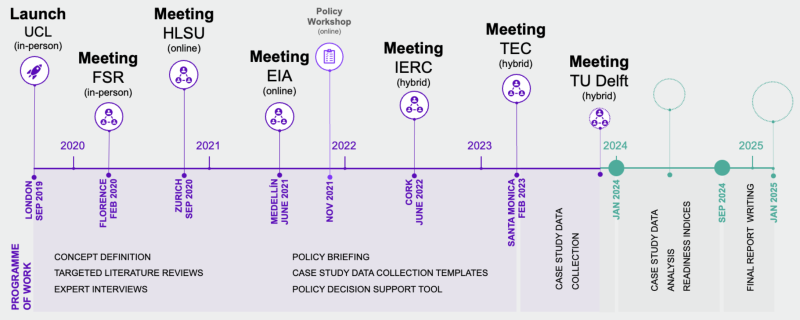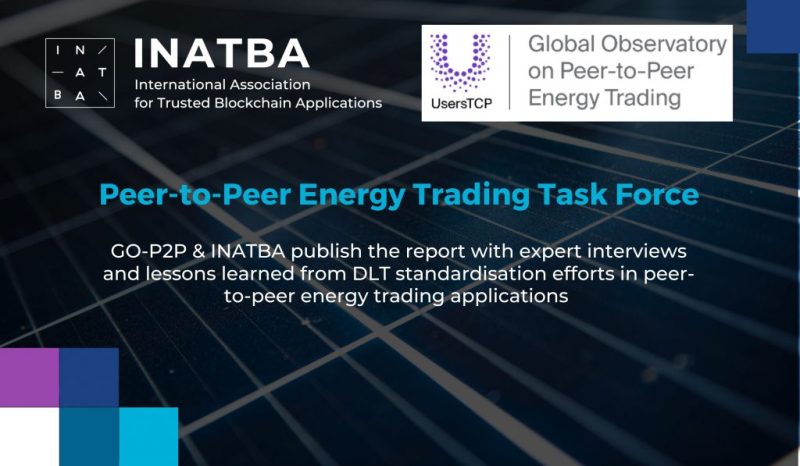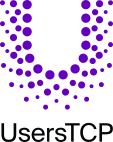
Synopsis
Overview
Task Duration:
September 2019 to February 2025
Participating countries:
Australia, Belgium, Ireland, Italy, the Netherlands, New Zealand, South Korea, Switzerland, United Kingdom, United States of America
Contact:
For more information on the Task, please contact the Task Leaders at GO-P2P@userstcp.org
Latest From GO-P2P
7th GO-P2P Meeting at TU Delft with focus on case studies
Last week we held our 7th GO-P2P Meeting at TUDelft. Two informative and intense days of expert presentations and lively discussions on the development of Local Energy Markets to
GO-P2P Concept Paper makes Top 10 downloads list on SSRN repository
The GO-P2P Concept Paper that our GO-P2P Task Leaders lead on has made the top 10 downloads from the section of the SSRN repository it’s housed on.
What we talk about when we talk about energy sharing – read the new GO-P2P blog
Defining Peer-to-Peer Energy Trading, Community Self-Consumption and Transactive Energy Models. As energy end-users take on a more active role in the energy system, new energy business models are developing to tackle a key challenge: how can we integrate decentralised energy assets into the grid and incentivise prosumers to provide flexibility services?
GO-P2P Publications
GO-P2P Policy Brief – Unlocking local energy markets
This policy briefing explores the policy changes needed to implement P2P/TE/CSC models, based on GO-P2P’s findings so far.
INATBA/GO-P2P Task Force final report
Peer-to-Peer Energy Trading Task Force DLT Standardisation Efforts in Peer-to-Peer Energy Trading Applications:Expert Interviews and Lessons Learned.
Subtasks & Deliverables
About the Observatory
The Global Observatory on Peer-to-Peer, Community Self-Consumption and Transactive Energy (GO-P2P) is a pre-competitive and early-stage research collaboration on the whole-system implications of local energy market models. Launched in September 2019, GO-P2P aims to share valuable insights into the factors that determine the success or failure of local energy models providing an authoritative and impartial evidence base for policy makers and regulators working on these innovative business models across the world.
GO-P2P is a Task of the User-Centred Energy Systems Technology Collaboration Programme 2 (UsersTCP) which sits under the auspices of the International Energy Agency (IEA) and brings together more than 200 experts from 10 member countries, representing academia, industry and non-profits, with additional knowledge contributions from experts in a further 15 countries.
Within GO-P2P, five subtasks (STs) led by world-leading institutions are working to understand the key challenges and evidence gaps surrounding five layers that need to be aligned if these models are to become widely deployed. These are:
- Subtask 1: Power systems integration
- Subtask 2: Hardware, software and data
- Subtask 3: Transactions and markets
- Subtask 4: Economic and social value
- Subtask 5: Policy and regulation.
GO-P2P has produced a series of landmark literature reviews across its five sub-tasks, and is now collecting case study data to provide evidence needed to make informed decisions to accelerate the uptake of LEMs. Using qualitative comparative analysis (QCA), GO-P2P will develop ‘readiness indices’ to assess the readiness of member countries to implement these new energy market models. These findings will not only serve policymakers, but also feed into the IEA and its publications.
Information for new participants
We welcome new participants! As a participant you can join any of the Observatory sub-tasks (by directly contacting the sub-task leads, whose details are included in the ‘sub-tasks’ section below) that align with your current work and to which you would be able to provide expertise. By participating you will not only be able to play an active role in shaping the Observatory’s deliverables, but also join an international community of experts in the field, providing opportunities for future collaboration.
Policymakers are a key target audience of the Observatory, as we want to ensure its findings respond to their evidence needs. In case you are a policymaker and interested in the Observatory, please get in touch with us.
To join GO-P2P or find out more about our work please contact our team at go-p2p@userstcp.org.
Launch
On 2-3 September 2019, the Global Observatory on Peer-to-Peer, Community Self-Consumption and Transactive Energy Models (GO-P2P) was officially launched in London, United Kingdom. The launch was attended by 110 stakeholders from a range of sectors, i.e. national and international policymakers, industry, start-ups, utilities, non-profits, academics etc. Up to 15 countries were represented, mainly from Europe but also Asia, Australia, North America and South America.
2020
The second meeting of GO-P2P took place on 17-18 February 2020 in Florence, Italy, at the European University Institute (Florence School of Regulation, FSR). The event was attended by 65 stakeholders from industry, policy and academia, representing 13 countries. The event included presentations of P2P/TE/CSC case studies and panel sessions with policymakers as well as industry representatives. For more information on the event:
- Event highlights by FSR
- Interview of Alexandra Schneiders (GO-P2P Operating Agent) for FSR podcast
- Blog by UK Foreign and Commonwealth Office (FCO) (event funder)
The third meeting took place (online) on 15-16 September 2020, and was hosted by Lucerne University of Applied Sciences and Arts (HSLU)- with the support of the Institute of Electrical and Electronics Engineers (IEEE), Swiss Federal Office of Energy (SFOE) and the International Renewable Energy Agency (IRENA).
2021
Our fourth meeting took place (online) on 12-13 July 2021. It was organised in collaboration with the International Energy Agency (IEA) initiative on Digital Demand-Driven Electricity Networks, 3DEN.
The first day of the event focused on the rollout of peer-to-peer energy systems in Latin America. The day included panel sessions featuring several peer-to-peer energy case studies in Latin America, including the Transactive Energy Colombia Initiative in Medellin (Colombia). Panellists represented organisations such as the Energy Sustainability Agency in Chile and ANEEL (Brazilian energy regulator). Despite the focus of the event being on Latin America, there was interest from the whole world, with 230+ registrations from 46 countries.
The second day of the event was an internal meeting of GO-P2P participants. It marked the launch of the next phase of work of the Global Observatory, namely its case study selection and data collection phase. In preparation for this, the GO-P2P sub-tasks have drafted literature reviews setting out the evidence gaps as regards the power systems integration, ICT/technology, market design, economic/social value and policy/regulation aspects of peer-to-peer energy models. These literature reviews can be seen in the ‘publications’ section below.
- For access to the presentations and recordings, please click here.
2022
The fifth meeting of GO-P2P took take place on 23-24 June 2022 as part of the IERC EnerConf workshop in Cork, Ireland. IERC leads GO-P2P’s sub-task 2 on the ICT/data layer of peer-to-peer energy models. The event provided valuable opportunities to discuss the rollout of community and peer-to-peer energy models in Ireland.
- Read more about the event here: 5th GO-P2P Meeting
2023
The sixth meeting of GO-P2P took place in Santa Monica, California, on 9-10 February 2023. It was organised by The Energy Coalition, and co-hosted by the City of Santa Monica. Presenters from organisations including Cleanwatts, Post Road Foundation and Powerledger presented pilots of peer-to-peer energy trading/transactive energy/community self-consumption in the United States and Europe. For social media coverage of the event click here.
The seventh meeting of GO-P2P took place in Delft, on the 29 November and 1 December 2023 in collaboration with TU Delft. The first day was dedicated to energy hubs and included a workshop organised in collaboration with User-Centred Energy Systems TCP, Netherlands Enterprise Agency and TU Delft PowerWeb Institute. Presentations focused on the social, economic and environmental challenges critical to the implementation of EnergyHubs.
The second day, themed ‘Making Local Energy Markets a Reality’, focused on the challenge of moving from pilots to a widespread implementation of Local Energy Markets (LEM). We enjoyed insightful presentations from our industry experts from the US, Netherlands, Germany and South Korea who shared their experiences of designing and operating local energy markets in real-world conditions. You can read our blog article here.
GO-P2P Timeline

SUB-TASK 1: Power systems integration
led by Lucerne University of Applied Sciences and Arts (HSLU), Switzerland (contact: Sidqi Yousra, yousra.sidqi@hslu.ch)
Activity:
1. Evaluate the benefits for the grid of P2P/CSC/TE energy markets.
2. Evaluate the key enablements and constraints arising from existing and likely future power system architectures and technologies.
SUB-TASK 2: Hardware, software & data
led by International Energy Research Centre, Ireland (contact: Brian O’Regan, brian.oregan@ierc.ie)
Activity:
1. Evaluating the role of the hardware, software and data ontologies on the functioning of P2P/CSC/TE energy markets.
2. Evaluate the key enablements and constraints arising from existing and likely future ICT solutions.
SUB-TASK 3: Transactions and markets
jointly led by University of Colorado Denver, United States (contact: Lynne Kiesling, lynne@knowledgeproblem.com) and University of Bristol, United Kingdom (contact: Ruzanna Chitchyan, r.chitchyan@bristol.ac.uk)
Activity:
1. Assess the architecture of the transaction layer for recording, balancing and settlement of imports and exports.
2. Evaluate the impacts of the design of P2P/CSC/TE energy markets on performance of the system.
SUB-TASK 4: Economic and social value
jointly led by Western Sydney University, Australia (contact: Declan Kuch, d.kuch@westernsydney.edu.au) and Delft University of Technology, (TU Delft) (contact: Abhigyan Singh , a.singh@tudelft.nl)
Activity:
1. Evaluate the construction of consumer value propositions based on economic and social value.
2. Evaluate how the ‘choice architecture’ of P2P/CSC/TE models impacts on participant engagement and outcomes.
SUB-TASK 5: Policy and regulation
jointly led by NOVA School of Law, Portugal (contact: Lucila de Almeida, lucila.dealmeida@novalaw.unl.pt) and European University Institute/Florence School of Regulation, Italy (contact: Nicolò Rossetto, Nicolo.Rossetto@eui.eu)
Activity:
1. Identify the impact of policy and regulation on the uptake of peer–to–peer and associated models.
2. Identify the key characteristics of the regulatory environment that support or inhibit their implementation.
University College London (United Kingdom) is in charge of overall management of the Observatory as well as the analysis of findings. For more information please contact the Task Lead Anna Gorbatcheva: go-p2p@userstcp.org.
| Country | Role | Name | Contact details |
|---|---|---|---|
| Australia | National Expert | Declan Kuch | Institute of Culture and Society Western Sydney University d.kuch@westernsydney.edu.au |
| Belgium | National Expert | Geert Deconinck | KU Leuven – ESAT/Electa Kasteelpark Arenberg 10 Bus 2445 3001 Leuven geert.deconinck@kuleuven.be |
| Ireland | National Expert | Brian O’Regan | International Energy Research Centre (IERC) Tyndall National Institute Lee Maltings, Dyke Parade T12 R5CP Cork brian.oregan@ucc.ie |
| Italy | National Expert | Nicolò Rossetto | Florence School of Regulation Via Giovanni Boccaccio 121 50133 Firenze FI Nicolo.Rossetto@eui.eu |
| Netherlands | National Expert | W.G.J.H.M. Van Sark | Utrecht University Princetonlaan 8A 3584 CB Utrecht w.g.j.h.m.vansark@uu.nl |
| New Zealand | National Expert | Anna Berka-Harnmeijer | Massey Business School 1 University Avenue, Albany, Auckland 0632, New Zealand a.berka@massey.ac.nz |
| Portugal | Task Sponsor | Lucila de Almeida | NOVA School of Law Campus de Campolide 18 1099-032 Lisbon lucila.dealmeida@novalaw.unl.pt |
| Switzerland | National Expert | Marine Pasquier | Swiss Federal Office of Energy Mühlestrasse 4 CH3063 Ittigen marine.pasquier@bfe.admin.ch |
| Switzerland | National Expert | Markus Bareit | Swiss Federal Office of Energy Mühlestrasse 4 CH3063 Ittigen markus.bareit@bfe.admin.ch |
| United Kingdom | National Expert | Stephen Perry | Ofgem 10 South Colonnade Canary Warf London E14 4 PU stephen.perry@ofgem.gov.uk |
| United States | National Expert | David Chassin | Stanford University 2575 Sand Hill Rd M/S 12 Menlo Park CA 94025 dchassin@slac.stanford.edu |
GO-P2P Literature Reviews:
- Sub-task 1 Power systems integration (November 2021)
- Sub-task 2 Hardware, software & data (June 2021)
- Sub-task 3 Transactions and markets (April 2022)
- Sub-task 4 Economic and social value (October 2021)
- Sub-task 5 Policy and regulation ( April 2021)
- Concept definition paper on peer-to-peer energy trading, transactive energy and community/collective self-consumption models.
Paper by UCL (managing entity) pre-print available here – September 2022 - INATBA/GO-P2P Task Force final report (December 2022)
- Policy recommendation brief – Unlocking Local Energy Markets

Join us for the 8th GO-P2P Event in Lisbon, Portugal on scaling up local energy markets. This year’s event is organised in collaboration with Nova School of Law and funded by the FCDO.
Where: NOVA School of Law, Lisbon, Portugal (hybrid)
When: 28th and 29th of May 2024
In recent years, local energy markets, including peer-to-peer energy trading, transactive energy and community self-consumption, have gained significant momentum. These initiatives empower energy end-users and small-scale prosumers to directly exchange electricity and encourage active engagement in the energy market.
While pilot projects have demonstrated the viability of these market models, challenges such as existing policies, regulations, and technical and social barriers hinder their scalability and wider adoption beyond the pilot phase. Many barriers inhibiting scaling relate to risk allocation and management. Pilot projects are carefully designed to cap up-side financial risk by defining project budget, scale and duration. Project participants’ risks are carefully controlled, with any financial losses underwritten by project funders. Regulatory risks have frequently been quarantined inside regulatory sandboxes to avoid wider energy system or political risks. Each of these are sensible precautions, but they are designed to limit, rather than acknowledge, allocate and manage such risks.
To scale beyond the pilot and the sandbox, such risks need to be accepted, evaluated and addressed. Portugal is one of the most progressive countries in adoption of local energy markets. Join us at the 8th GO-P2P meeting to learn from Portuguese and other European cases, companies and regulators on how they have addressed such risks, and the extent to which their solutions may be adopted and adapted for other contexts.
The Joint Task Force between INATBA (International Association for Trusted Blockchain Applications) and GO-P2P ran from July 2020 to December 2022.
In December 2022, UCL presented findings from the Task Force’s final report at an event organised by the European Commission and INATBA, entitled “Joining Forces for Blockchain Standardisation”.

The report sets out findings from interviews of 7 start-ups conducting 16 pilots around the world of peer-to-peer energy trading using distributed ledger technologies (DLTs, e.g. blockchain). We interviewed start-ups about the difficulties of scaling up P2P energy models using DLTs, particularly due to difficulties around preserving the data privacy of participants, and the need for standardisation to shield consumers from associated risks.
- Read the report here

